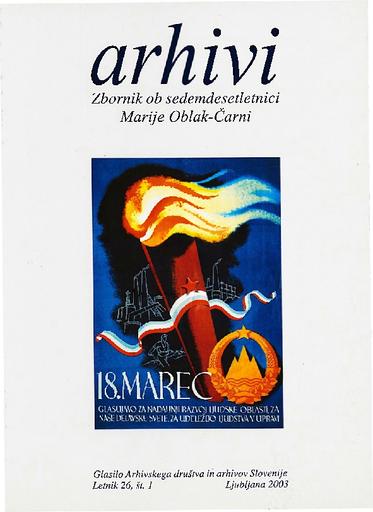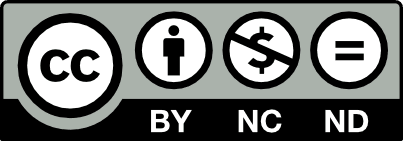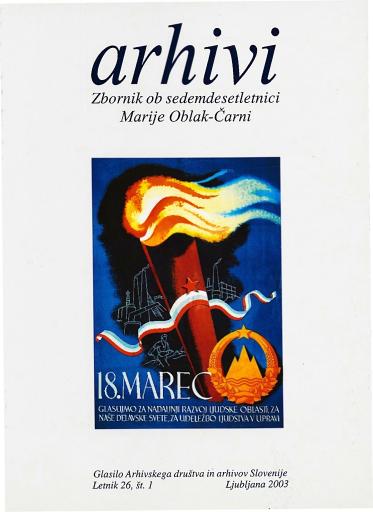
/
Periodicals
/
Archives
Communist party, Antifascist women's league and the realisation of the equality of women in Slovenia (1943-1953)

Author(s):Mateja Jeraj
Co-author(s):Matevž Košir (ur.)
Leto:2003
Publisher(s):Arhivsko društvo Slovenije, Ljubljana
Source(s):Arhivi, 2003, št. 1
Language(s):slovenščina
Type(s) of material:text
Keywords:ženske, enakopravnost žensk, žensko vprašanje, komunizem, 1943-1953, Slovenija, women, equality, 1943-1953, Slovenia
Rights:

This work by Mateja Jeraj is licensed under Creative Commons Attribution-NonCommercial-NoDerivs 4.0 International
Files (1)

Name:ARHIVI_2003-1.pdf
Size:22.96MB
Format:application/pdf
Permanent link:https://hdl.handle.net/11686/file309
Description
Both Slovene and Yugoslav communists formed their attitude to the issue of women on the basis of
the Marxist theory and practical experience in the Soviet Union. In socialism a woman was not
supposed to be merely a mother and a housewife, but also an employed, educated and politically
active person. Therefore the socialist state should ensure that women get an equal status in the family
and society. The communist party mostly rejected the establishment of independent women's
organisations, saying that the issue of women is only a part of the working class struggle. However,
under exceptional circumstances during the Second World War and the revolution, the party
leadership decided to establish a special women's organisation. At first its purpose was to draw
women into the National Liberation War. After the war it helped in rebuilding the state and resolving
social issues, it promoted employment and education of women and their participation in governing
and political bodies and it dealt with maternal and children issues. However, its main purpose was to
educate women, especially those coming from the countryside, in socialist spirit and draw them away
from the influence of its adversaries.
Metadata (12)
- identifierhttps://hdl.handle.net/11686/9620
- title
- Komunistična partija, Antifašistična fronta žensk in uresničevanje ženske enakopravnosti v Sloveniji (1943-1953)
- Communist party, Antifascist women's league and the realisation of the equality of women in Slovenia (1943-1953)
- creator
- Mateja Jeraj
- contributor
- Matevž Košir (ur.)
- subject
- ženske
- enakopravnost žensk
- žensko vprašanje
- komunizem
- 1943-1953
- Slovenija
- women
- equality
- 1943-1953
- Slovenia
- description
- Both Slovene and Yugoslav communists formed their attitude to the issue of women on the basis of the Marxist theory and practical experience in the Soviet Union. In socialism a woman was not supposed to be merely a mother and a housewife, but also an employed, educated and politically active person. Therefore the socialist state should ensure that women get an equal status in the family and society. The communist party mostly rejected the establishment of independent women's organisations, saying that the issue of women is only a part of the working class struggle. However, under exceptional circumstances during the Second World War and the revolution, the party leadership decided to establish a special women's organisation. At first its purpose was to draw women into the National Liberation War. After the war it helped in rebuilding the state and resolving social issues, it promoted employment and education of women and their participation in governing and political bodies and it dealt with maternal and children issues. However, its main purpose was to educate women, especially those coming from the countryside, in socialist spirit and draw them away from the influence of its adversaries.
- Odnos do tako imenovanega ženskega vprašanja so tako slovenski kot jugoslovanski komunisti izoblikovali na podlagi marksistične teorije in praktičnih izkušenj Sovjetske zveze. V socializmu naj ženska ne bi bila le mati in gospodinja, ampak tudi zaposlena, izobražena in politično dejavna. Zato naj bi socialistična država ženskam zagotovila enakopraven položaj v družini in družbi. Ustanavljanje samostojnih ženskih organizacij je komunistična partija sicer načeloma odklanjala, češ da je žensko vprašanje le del boja delavskega razreda. V izrednih razmerah druge svetovne vojne in revolucije pa se je partijsko vodstvo kljub temu odločilo ustanoviti posebno žensko organizacijo. Sprva je bila zadolžena za pritegnitev žensk k sodelovanju v narodnoosvobodilnem boju, po vojni pa je pomagala pri obnovi države in pri reševanju socialnih vprašanj, vzpodbujala je zaposlovanje in izobraževanje žensk ter njihovo vključevanje v oblastne in politične organe, ukvarjala se je z materinsko in otroško problematiko, njena glavna naloga pa je bila, da ženske, predvsem tiste s podeželja, vzgoji v duhu socializma injih odtegne vplivu njegovih nasprotnikov.
- publisher
- Arhivsko društvo Slovenije
- date
- 2003
- type
- besedilo
- language
- Slovenščina
- isPartOf
- rights
- license: ccByNcNd
Citirano v (1)
| Tipologija | Avtor(ji) | Naslov | Kraj | Založba | Leto |
|---|---|---|---|---|---|
| 1.01 Izvirni znanstveni članek | Vrhovac, Marina | "Nova ženska - skrbna mati, žena in gospodinja, zraven pa še veliko več - zaposlena, izobražena in politično dejavna." : Vida Tomšič in žensko vprašanje | Celje | Zgodovinsko društvo | 2015 |
Seznam literature v delu (1)
| Stran | Avtor | Naslov | Vir | Kraj | Založba | Leto |
|---|---|---|---|---|---|---|
| 163 | Deželak-Barič, Vida | Vloga in položaj žensk na slovenskem v narodnoosvobodilnem boju in revoluciji 1941-1945 | Naše žene volijo | Ljubljana | 1999 |